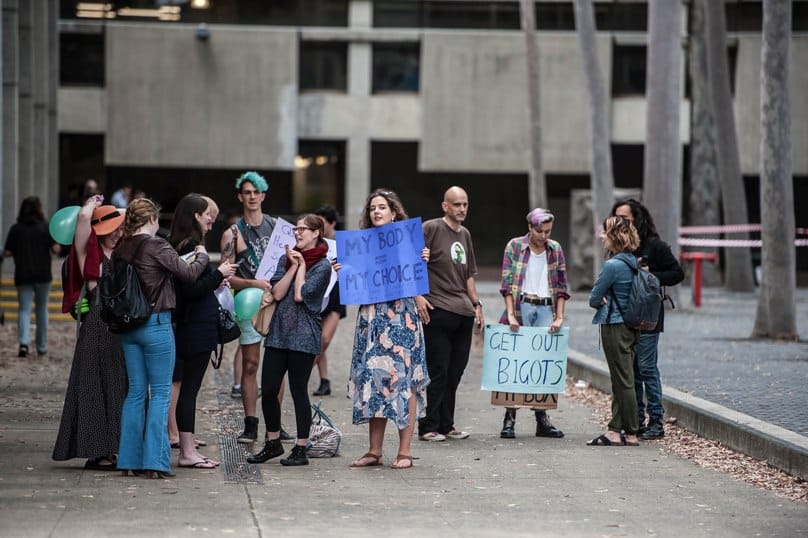
Last week, I wrote about a number of attempts to use the civil law to silence those who would promote a pro-marriage, pro-family worldview.
The first example was the attempt to use anti-discrimination laws to prevent Catholic schools in Tasmania from teaching the Catholic understanding of marriage.
And the second example was the use of migration laws to revoke the visa of US pro-life speaker Troy Newman and keep him from entering the country to fulfill a number of speaking engagements.
The reason given was that the visit was a threat to the “good order” of the Australian community.
Alarmingly in Mr Newman’s case, the decision was based on media reports of a strong reaction against Mr Newman’s visit, and a petition asking for him to be denied entry to Australia gaining a large number of signatories. The threat to the “good order” of the community was that those who were objecting to his visit might protest his presence here.
In other words, Mr Newman himself was not threatening, rather it was those who might oppose him who were the risk to good order. The reason his visa was revoked – and the reason his talks were unable to be held – was because of the likely actions of others.
The potential capability of others to shut down conversation became even more apparent to me last week, when I was invited to deliver a talk as part of Macquarie University’s Life Week. This, along with Christ Week, is one of two “mission weeks” on our university campuses during which the university chaplaincies hold public events, encouraging non-Catholic students to engage with chaplaincy members. For Macquarie University, this meant a series of campus courtyard talks on issues pertaining to life, marriage and family issues.
On Tuesday last week, I spoke about the ways in which a redefinition of marriage could affect more people than those entering into same-sex marriages.
Along with those who came to listen to the talk were a number from the various student atheist societies who had come to challenge what I had to say. They were quiet during the talk, but they largely overran the Q&A session, shouting me down as I attempted to respond.
Following the talk, these students (and others who were not present) took to Facebook to complain about the “homophobic rant” which I had apparently undertaken with reckless disregard to the mental health of LGBTI students on campus. In support of this accusation, they fabricated quotes and attributed them to me.
These protesters also tried to have the university shut down the talk scheduled for the following day, which was to discuss the Planned Parenthood scandal in the US and the commodification of human life.
A protest was organised via Facebook, and protesters showed up with placards, megaphones and loudspeakers used to try to intimidate the speaker and drown out her talk.
Because there were a few dozen attending in protest, campus security and police intervened to ensure the speaker was safe. The Q&A session was aggressive, with many of the protesters using the time to scream at the speaker, who maintained both her composure and her charity throughout.
There are several appalling things about their approach.
Least importantly, misrepresenting a person does an injustice to them. Additionally, the ease at which incorrect statements were invented and published shows a blatant (and disturbing) disregard for the truth. Also crucial is the real damage that could be done to LGBTI students by the lies told.
If those protesting were truly concerned about the effects that hurtful statements could have on the mental health of vulnerable LGBTI students, then they should not have invented comments, represented that they were made, and published them online – it was these comments, and not the content of my talk, that would have contributed to any rejection or condemnation felt by the LGBTI students in the university. The protesters, in the name of LGBTI rights, used the LGBTI students as means to their own ends.
The online bullying that Wednesday’s speaker received before and after her talk was tantamount to harassment. And the way some of the protesters conducted themselves at the talk added to the intimidation.
But lies, intimidation and shouting are not conducive to any type of meaningful dialogue. Instead, it evidences a mentality of “might is right”, that morality is determined by who is the most powerful and/or the most vocal. It is the complete antithesis to what we believe as Catholics.
That they behaved in this way was providential, because it meant that the Catholic students on campus who attended both of the talks learnt so much more than what was contained in our prepared remarks.
In addition to life and family issues, the students were also able to see the tangible difference between those who use truth and charity to support their proposals, and those who use lies, intimidation and shouting. They witnessed a “might is right” approach alongside an approach of speaking the truth, in love, even in the face of attack.
I might be biased, but only one of these approaches is attractive, and I hope the students agreed. It is a reminder that even in circumstances where others are trying to shut us down, God can always bring good from it.
